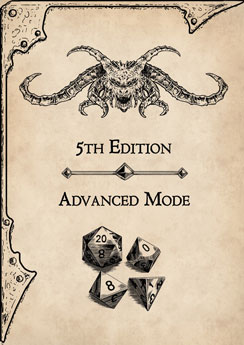Medium plant (myconid), lawful neutral
Armor Class 12 (natural armor)
Hit Points 22 (4d8 + 4)
Speed 20 ft.
Proficiency Bonus +2
Proficiency Bonus +3 (5th Edition Advanced Mode)
| STR | DEX | CON | INT | WIS | CHA |
|---|---|---|---|---|---|
| 10 (+0) | 10 (+0) | 12 (+1) | 10 (+0) | 13 (+1) | 7 (-2) |
Senses darkvision 120 ft., passive Perception 11
Languages –
Challenge 1/2 (100 XP)
Distress Spores. When the myconid takes damage, all other myconids within 240 feet of it can sense its pain.
Sun Sickness. While in sunlight, the myconid has disadvantage on ability checks, attack rolls, and saving throws. The myconid dies if it spends more than 1 hour in direct sunlight.
ACTIONS
- Fist. Melee Weapon Attack: +2 to hit, reach 5 ft., one target. Hit: 5 (2d4) bludgeoning damage plus 5 (2d4) poison damage.
- Pacifying Spores (3/Day). The myconid ejects spores at one creature it can see within 5 feet of it. The target must succeed on a DC 11 Constitution saving throw or be stunned for 1 minute. The target can repeat the saving throw at the end of each of its turns, ending the effect on itself on a success.
- Rapport Spores. A 20-foot radius of spores extends from the myconid. These spores can go around corners and affect only creatures with an Intelligence of 2 or higher that aren’t undead, constructs, or elementals. Affected creatures can communicate telepathically with one another while they are within 30 feet of each other. The effect lasts for 1 hour.
5th Edition Advanced Mode
Limiting the power of a character and making the overall difficulty of the game harder, does not reduce the creativity, indeed it does quite the opposite.
The Game Master has the option to use any and all of the instances proposed in this guide, or just some of them according to their preference.
It is the lack of something that move and motivate characters, not the abundance of it
DESCRIPTION
Myconids, or fungus men, are a race of sentient fungi that live in the dark and damp places of the world, such as the remote reaches of the Underdark. They have humanoid shapes, but their bodies are composed of various types of mushrooms, mold, and spores. They have no eyes, ears, nose, or mouth, but they can sense their surroundings through vibrations and chemical signals. They communicate with each other and other creatures through telepathy, using spores that create a mental link. They have a peaceful and communal nature, and they value harmony and tranquility above all else .
COMBAT
Myconids are not aggressive by nature, but they will defend themselves and their colony if threatened. They have several types of spores that they can use for different purposes. Some spores can stun or pacify enemies, while others can create distress signals or rapport among allies. Myconids also have a natural resistance to poison and disease, and they can heal themselves by absorbing nutrients from the soil . Myconids prefer to avoid direct sunlight, as it weakens them and can eventually kill them . Myconids’ Hit Dice determine their social status and abilities.
HABITAT / SOCIETY
Myconids live in underground colonies called circles, each led by a sovereign who is the oldest and wisest member of the group. The sovereign is responsible for maintaining the harmony and well-being of the circle, as well as communicating with other circles and races. Myconids have a simple and egalitarian society, where each individual has a role and a function according to their age and abilities. They do not have a concept of gender, family, or personal possessions, as they share everything with their circle . Myconids are cautious creatures that deplore violence; they have no desire to conquer anybody and would prefer to be left alone.
ECOLOGY
Myconids are part of the natural cycle of decay and renewal in the underground ecosystems. They feed on organic matter, such as dead plants and animals, and recycle it into fertile soil. They also cultivate various types of fungi for food, medicine, and other purposes. They have a symbiotic relationship with other creatures that live in the dark, such as oozes, slimes, molds, and mushrooms. They are generally friendly and curious towards other races, especially those who respect their way of life and their environment.
